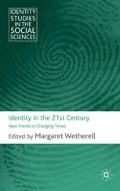Abstract
Lily Haley and Lorna, her daughter, are both white women who grew up on the Larkman estate in Norwich, England, a place that has been stigmatised by others in the city.l As we show in this chapter, superficially their backgrounds on the estate, characterised by extreme poverty and compounded by early parental death, alcoholism and domestic violence, suggest the kind of stereotypical working-class lives associated with a ‘deprived’ area. However, the picture revealed through the two women’s telling of their life histories was much more complex, and showed the different ways in which both women had worked hard at creating liveable lives for themselves. Their stories illustrate the crucial role of self-identification and categorisation in this process and the importance of understanding how both operate relationally (see Jenkins, 1996, 2000).
When I was a child and a young woman I felt I knew my place. Then I moved on and got to know other people from different backgrounds. Now I feel in the middle, don’t really belong either side. If I said this out loud I would be accused of being a snob …. A visitor to the house I was cleaning once said to me, ‘you don’t look like a cleaner’. And I said, ‘What, am I supposed to have curlers in and a head scarf?’ … I would have looked much as I do now. But he again had an idea in his head. About what cleaners should look like and what cleaners should sound like. And I found that a bit. That, I suppose cartoon character of cleaner. With a turban thing not a head-scarf or whatever. Which I could never do. And that made me think how we are. So then I had this thing about, do I say ‘I’m a cleaner’? Although I did. Sort of fundamentally honest, I suppose. But it’s odd. Because if I tell people I’m a cleaner they’re going to have this particular image of me, which is not necessarily the right one. It’s just a very small part. And a necessity. (Lily Haley)
It’s the shame factor which has gone [pauses] now. I know certainly when I grew up … it was shameful to come from the Larkman, even though most of the people around me also came from the Larkman and obviously were at Bowthorpe [comprehensive school] … I left, I went to university, so there you go … I’ve now qualified myself as ‘survived the Larkman’ (Lorna Haley)
Access this chapter
Tax calculation will be finalised at checkout
Purchases are for personal use only
Preview
Unable to display preview. Download preview PDF.
References
Butler, J. (2004) Undoing Gender. London and New York: Routledge.
hooks, b.. (2000) Where We Stand: Class Matters. London and New York: Routledge.
Jenkins, R. (1996) Categorization: Identity, Social Process and Epistemology. Current Sociology 48 (3), 7–25.
Jenkins, R. (2000) Social Identity. London: Routledge.
Rogaly, B. and Taylor, B. (2009) Moving Histories of Class and Community: Identity, Place and Belonging in Contemporary England. Basingstoke: Palgrave Macmillan.
Sayer, A. (2005) The Moral Significance of Class. Cambridge: Cambridge University Press.
Skeggs, B. (2009) Class, Culture and Morality: Legacies and Logics in the Space for ldentification. In M. Wetherell and C. Talpede Mohanty (eds) The Sage Handbook of Identities. London: Sage.
Willis, P. (1977) Learning to Labour: How Working Class Kids get Working Class Jobs. Farnborough: Saxon House.
Editor information
Editors and Affiliations
Copyright information
© 2009 Ben Rogaly and Becky Taylor
About this chapter
Cite this chapter
Rogaly, B., Taylor, B. (2009). ‘I Don’t Want to Be Classed, But We Are All Classed’: Making Liveable Lives Across Generations. In: Wetherell, M. (eds) Identity in the 21st Century. Identity Studies in the Social Sciences. Palgrave Macmillan, London. https://doi.org/10.1057/9780230245662_3
Download citation
DOI: https://doi.org/10.1057/9780230245662_3
Publisher Name: Palgrave Macmillan, London
Print ISBN: 978-1-349-36881-5
Online ISBN: 978-0-230-24566-2
eBook Packages: Palgrave Social & Cultural Studies CollectionSocial Sciences (R0)

